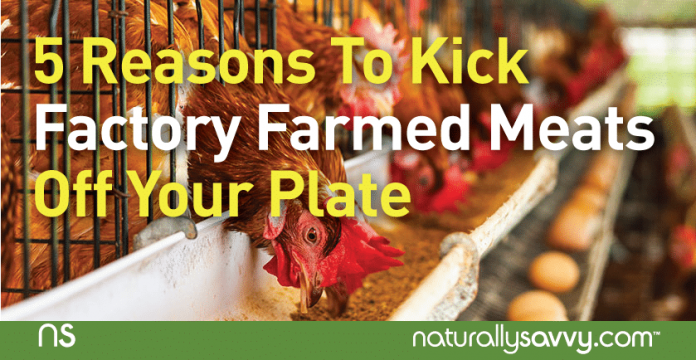
These days, just about everything is mass-produced, including our food, with large, factory-style farms churning out a seemingly endless supply of meat, chickens, eggs and dairy products. All that mass production equals abundance and lower prices, but if those factory-farmed products are eroding your health, is the savings really worth it? Not in my book. Here’s what’s really going on with mass-produced meats and why you should steer clear:
1. Factory-farmed animals eat crap. Literally.
To keep production costs low, animals raised in factory farms are fed the cheapest possible grains and feeds containing among other things, “by-product feedstuff, ” which begs the question, what’s feedstuff? It’s a nausea-inducing assortment of disturbing ingredients, including municipal garbage, stale cookies, poultry manure, chicken feathers, bubble gum and even restaurant waste. So, when you eat factory-farmed animals, you’re also getting an unintentional serving of “feedstuff.”
In short, their bad diet becomes your bad diet – which is counter-productive to your health.
2. Bad diets make for sick animals – and people too.
Cud-chewing critters such as cattle, dairy cows, goats, bison and sheep were designed to eat fibrous grasses, plants, and shrubs-not starchy, low-fiber grains and feedstuffs. When these animals are switched from pasture greenery to grains, many wind up suffering from a number of disorders and painful conditions. The sickened animals are then given chemical additives, plus constant, low-level doses of antibiotics.
Their drugs in turn enter your system when you eat antibiotic-treated animals, setting the stage for drug-resistance in your body, particularly if you’re a heavy-duty carnivore.
Read More: The Health Benefits of Grass-fed Beef
3. Lousy ingredients won’t create a nutritious product.
It should come as no surprise that animals fed a crappy diet will make for a less nutritious meal. Compared to grass-fed, factory-farmed, grain-fed meats have less vitamin E, beta-carotene, and little of the two health-promoting fats called omega-3 fatty acids and “conjugated linoleic acid,” or CLA.
So what’s the end-result of the feed-’em-fast-and-cheap factory farmed method? Inferior food with negligible nutrients and more of the unhealthy fats. Small wonder the stuff is so much cheaper than grass-fed.
If your goal is to sustain wellness, factory-farmed products just don’t deliver the nutritional goods. In factory farms, chickens, turkeys, and pigs are typically raised in inhumane conditions, tightly packed into cages and pens, unable to practice normal behaviors, such as rooting, grazing, and roosting.
In these conditions, the animals get stressed and wind up producing products that are lower in a number of key vitamins and omega-3 fatty acids – talk about empty calories!
Read More: Pasture-raised Eggs: Why it is the Healthier Choice
5. Factory farming pollutes the earth.
In a conventional feedlot operation, for example, confined cattle deposit large amounts of manure in a small amount of space. The manure must be collected and removed. As it costs money to haul it away, the manure is often dumped nearby, close to the feedlot. As a result, the surrounding soil gets over-saturated with the stuff, resulting in ground and water pollution. But when animals are raised on pasture, their manure is a welcome source of organic fertilizer, not a “waste management problem.”
Bottom line: raising animals on pasture is kinder to the environment.
In short, though factory farming enables us to have plenty of cheap and convenient food, it’s food with little nutritional benefit, that can increase your resistance to antibiotics as it pollutes your air, land and water. With so little going for it, doesn’t it seem slightly crazy to eat factory-farmed meats? It certainly does to me – which is why I strongly suggest that if you’re going to eat meat, buy the good stuff, even if it means having to pay a bit more or buy less of it. Choose grass-fed beef, lamb, bison and poultry, to insure that you’re eating nutritious and healthy meats, as nature intended.
To learn more about what to look for when buying meat, check out my post on meat labeling and for some additional inspiration, check out this animation movie about the meat you eat at themeatrix.com.
This article originally appeared on DrFrankLipman.com.










